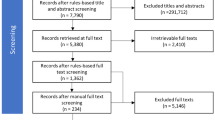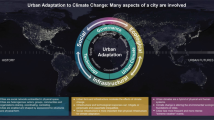Abstract
Climate mitigation research puts increasing emphasis on cities, but much more could be learned from urban case studies. The overall size, geographic scope and topic content of cases remains unknown, resulting in few attempts to synthesise the bottom-up evidence. Here, we use scientometric and machine-learning methods to produce a comprehensive map of the literature. Our database of approximately 4,000 case studies provides a wealth of evidence to search, compare and review. We find that cities in world regions with the highest future mitigation relevance are systematically underrepresented. A map of the evidence allows case studies to be matched with urban typologies in new and more ambitious forms of synthesis, bringing together traditionally separate strands of qualitative and quantitative urban research.
This is a preview of subscription content, access via your institution
Access options
Access Nature and 54 other Nature Portfolio journals
Get Nature+, our best-value online-access subscription
$29.99 / 30 days
cancel any time
Subscribe to this journal
Receive 12 print issues and online access
$209.00 per year
only $17.42 per issue
Buy this article
- Purchase on Springer Link
- Instant access to full article PDF
Prices may be subject to local taxes which are calculated during checkout





Similar content being viewed by others
Data availability
The full list of case studies is provided in Supplementary Dataset 1.
References
Acuto, M., Parnell, S. & Seto, K. C. Building a global urban science. Nat. Sustain. 1, 2–4 (2018).
Acuto, M. & Susan, P. Leave no city behind. Science 352, 873 (2016).
Minx, J. C., Callaghan, M., Lamb, W. F., Garard, J. & Edenhofer, O. Learning about climate change solutions in the IPCC and beyond. Environ. Sci. Policy 77, 252–259 (2017).
Creutzig, F., Baiocchi, G., Bierkandt, R., Pichler, P.-P. & Seto, K. C. Global typology of urban energy use and potentials for an urbanization mitigation wedge. Proc. Natl Acad. Sci. USA 112, 6283–6288 (2015).
Grandin, J., Haarstad, H., Kjærås, K. & Bouzarovski, S. The politics of rapid urban transformation. Curr. Opin. Environ. Sustain. 31, 16–22 (2018).
Lamb, W. F., Callaghan, M. W., Creutzig, F., Khosla, R. & Minx, J. C. The literature landscape on 1.5 °C climate change and cities. Curr. Opin. Environ. Sustain. 30, 26–34 (2018).
World Urbanization Prospects: The 2018 Revision. (UN DESA, 2018).
Kartha, S. et al. Cascading biases against poorer countries. Nat. Clim. Change 8, 348–349 (2018).
O’Neill, D. W., Fanning, A. L., Lamb, W. F. & Steinberger, J. K. A good life for all within planetary boundaries. Nat. Sustain. 1, 88–95 (2018).
Gonzalez-Brambila, C. N., Reyes-Gonzalez, L., Veloso, F. & Perez-Angón, M. A. The scientific impact of developing nations. PLoS ONE 11, (2016).
Wiedenhofer, D., Lenzen, M. & Steinberger, J. K. Energy requirements of consumption: urban form, climatic and socio-economic factors, rebounds and their policy implications. Energ. Policy 63, 696–707 (2013).
Creutzig, F. et al. Urban infrastructure choices structure climate solutions. Nat. Clim. Change 6, 1054 (2016).
Creutzig, F. How fuel prices determine public transport infrastructure, modal shares and urban form. Urban Clim. 10, 63–76 (2014).
Steinberg, P. F. Can we generalize from case studies? Glob. Environ. Polit. 15, 152–175 (2015).
Flyvbjerg, B. Five misunderstandings about case-study research. Qual. Inq. 12, 219–245 (2006).
Lijphart, A. Comparative politics and the comparative method. Am. Polit. Sci. Rev. 65, 682–693 (1971).
Lind, A. & Espegren, K. The use of energy system models for analysing the transition to low-carbon cities – the case of Oslo. Energy Strateg. Rev. 15, 44–56 (2017).
Feng, K., Hubacek, K., Sun, L. & Liu, Z. Consumption-based CO2 accounting of China’s megacities: the case of Beijing, Tianjin, Shanghai and Chongqing. Ecol. Indic. 47, 26–31 (2014).
Pichler, P. P. et al. Reducing urban greenhouse gas footprints. Sci. Rep. 7, 1–11 (2017).
Romero-Lankao, P. & Hardoy, J. in The Urban Climate Challenge: Rethinking the Role of Cities in the Global Climate Regime (eds. Johnson, C., Toly, N. & Schroeder, H.) 181–204 (Routledge, London, 2015).
Creutzig, F., Mühlhoff, R. & Römer, J. Decarbonizing urban transport in European cities: four cases show possibly high co-benefits. Environ. Res. Lett. 7, 044042 (2012).
C40 Cities Climate Leadership Group. C40 Cities. (2017). Available at: http://www.c40.org/. (Accessed: 10th November 2017)
Urban transition insights from industrial legacy cities (ICLEI - Local Governments for Sustainability, 2018).
Nangini, C. et al. A global dataset of CO2 emissions and ancillary data related to emissions for 343 cities. Sci. Data 6, 180280 (2018).
Global Climate Action NAZCA (UNFCCC, accessed 26 November 2018); http://climateaction.unfccc.int/
Reckien, D. et al. How are cities planning to respond to climate change? Assessment of local climate plans from 885 cities in the EU-28. J. Clean. Prod. 191, 207–219 (2018).
Reckien, D. et al. Climate change response in Europe: what’s the reality? Analysis of adaptation and mitigation plans from 200 urban areas in 11 countries. Clim. Change 122, 331–340 (2014).
Castán Broto, V. & Bulkeley, H. A survey of urban climate change experiments in 100 cities. Glob. Environ. Chang. 23, 92–102 (2013).
Bartlett, S. & Satterthwaite, D. Cities on a Finite Planet: Towards transformative responses to climate change. (Routledge, London, 2016).
Rosenzweig, C. et al. ARC3.2 Summary for City Leaders (Urban Climate Change Research Network, Columbia University, New York, 2015).
Sovacool, B. K. & Brown, M. A. Twelve metropolitan carbon footprints: a preliminary comparative global assessment. Energ. Policy 38, 4856–4869 (2010).
Baiocchi, G., Creutzig, F., Minx, J. & Pichler, P. P. A spatial typology of human settlements and their CO2 emissions in England. Glob. Environ. Chang. 34, 13–21 (2015).
Moran, D. et al. Carbon footprints of 13 000 cities. Environ. Res. Lett. 13, 064041 (2018).
Sustainable Urban Systems Subcommittee. Sustainable Urban Systems: Articulating a Long-Term Convergence Research Agenda (Advisory Committee for Environmental Research and Education, 2018).
Resilient Cities Report 2018 (ICLEI, 2018).
Grubler, A. et al. in Global Energy Assessment: Toward a Sustainable Future (eds Johansson, T. B. et al) 1307–1400 (Cambridge Univ. Press, Cambridge, 2012).
Seto C., K. et al. in Climate Change 2014: Mitigation of Climate Change (eds Edenhofer, O. et al) 923–1000 (IPCC, Cambridge Univ. Press, 2014).
UCCRN. Climate change and cities: First assessment report of the urban climate change research network. (Cambridge Univ. Press, 2011).
Gaunt, M., Rye, T. & Allen, S. Public acceptability of road user charging: the case of Edinburgh and the 2005 referendum. Transp. Rev. 27, 85–102 (2007).
Schaller, B. New York City’s congestion pricing experience and implications for road pricing acceptance in the United States. Transp. Policy 17, 266–273 (2010).
Berrang-Ford, L., Pearce, T. & Ford, J. D. Systematic review approaches for climate change adaptation research. Reg. Environ. Chang. 15, 755–769 (2015).
Sorrell, S. Improving the evidence base for energy policy: the role of systematic reviews. Energ. Policy 35, 1858–1871 (2007).
Haddaway, N. R. & Macura, B. The role of reporting standards in producing robust literature reviews. Nat. Clim. Chang. 8, 444–453 (2018).
Kastner, M., Antony, J., Soobiah, C., Straus, S. E. & Tricco, A. C. Conceptual recommendations for selecting the most appropriate knowledge synthesis method to answer research questions related to complex evidence. J. Clin. Epidemiol. 73, 43–49 (2016).
Srivastava, A., Van Passel, S. & Laes, E. Assessing the success of electricity demand response programs: a meta-analysis. Energy Res. Soc. Sci. 40, 110–117 (2018).
Francis, L. F. M. & Jensen, M. B. Benefits of green roofs: A systematic review of the evidence for three ecosystem services. Urban For. Urban Green. 28, 167–176 (2017).
Song, X. P., Tan, P. Y., Edwards, P. & Richards, D. The economic benefits and costs of trees in urban forest stewardship: a systematic review. Urban For. Urban Green. 29, 162–170 (2018).
Gota, S., Huizenga, C., Peet, K., Medimorec, N. & Bakker, S. Decarbonising transport to achieve Paris Agreement targets. Energy Effic. 12, 363–386 (2018).
Huang, P. & Castán Broto, V. Interdependence between urban processes and energy transitions: the urban energy transitions (DUET) framework. Environ. Innov. Soc. Transitions 28, 35–45 (2018).
Newig, J. & Fritsch, O. The case survey method and applications in political science. in APSA 2009 Meeting (APSA, 2009).
Nijkamp, P. & Pepping, G. A meta-analytical evaluation of sustainable city initiatives. Urban Stud. 35, 1481–1500 (1998).
Haddaway, N. R., Bernes, C., Jonsson, B. G. & Hedlund, K. The benefits of systematic mapping to evidence-based environmental management. Ambio 45, 613–620 (2016).
James, K. L., Randall, N. P. & Haddaway, N. R. A methodology for systematic mapping in environmental sciences. Environ. Evid. 5, 1–13 (2016).
Godfrey, N. & Savage, R. Future Proofing Cities: risks and opportunities for inclusive urban growth in developing countries. (Atkins, UK Department for International Development, 2013).
Creutzig, F. et al. Upscaling urban data science for global climate solutions. Glob. Sustain. 2, 1–25 (2019).
Louf, R. & Barthelemy, M. A typology of street patterns. J. R. Soc. Interface 11, 20140924 (2014).
Bennett, A. & Elman, C. Qualitative research: recent developments in case study methods. Annu. Rev. Polit. Sci. 9, 455–476 (2006).
Glaeser, E. L. & Kahn, M. E. The greenness of cities: carbon dioxide emissions and urban development. J. Urban Econ. 67, 404–418 (2010).
Seto, K. C., Golden, J. S., Alberti, M. & Turner, B. L. Sustainability in an urbanizing planet. Proc. Natl Acad. Sci. USA 114, 201606037 (2017).
McPhearson, T. et al. Scientists must have a say in the future of cities. Nature 538, 165–166 (2016).
Solecki, W. et al. City transformations in a 1.5 °C warmer world. Nat. Clim. Chang. 8, 177–185 (2018).
Ürge-Vorsatz, D. et al. Locking in positive climate responses in cities. Nat. Clim. Chang. 8, 174–177 (2018).
Nagendra, H., Bai, X., Brondizio, E. S. & Lwasa, S. The urban south and the predicament of global sustainability. Nat. Sustain. 1, 341–349 (2018).
IPCC: Summary for Policymakers in Special Report: Global Warming of 1.5 o C (eds Masson-Delmotte, V. et al.) (Cambridge Univ. Press, 2018).
Nagendra, H. The global south is rich in sustainability lessons that students deserve to hear. Nature 557, 485–488 (2018).
Vogel, B. & Henstra, D. Studying local climate adaptation: a heuristic research framework for comparative policy analysis. Glob. Environ. Chang. 31, 110–120 (2015).
Margulies, J. D., Magliocca, N. R., Schmill, M. D. & Ellis, E. C. Ambiguous geographies: connecting case study knowledge with global change science. Ann. Am. Assoc. Geogr. 106, 572–596 (2016).
Pedregosa, F. et al. Scikit-learn: machine learning in Python. J. Mach. Learn. Res. 12, 2825–2830 (2011).
Lee, D. D. & Seung, H. S. Learning the parts of objects by non-negative matrix factorization. Nature 401, 788–91 (1999).
Acknowledgements
M.W.C. acknowledges financial support from the Heinrich Böll Foundation.
Author information
Authors and Affiliations
Contributions
W.F.L., F.C. and J.C.M. designed the research. W.F.L. and M.W.C. performed the analysis. W.F.L. wrote the manuscript with contributions from all authors.
Corresponding author
Ethics declarations
Competing interests
The authors declare no competing interests.
Additional information
Journal peer review information: Nature Climate Change thanks Brenna Walsh and other anonymous reviewer(s) for their contribution to the peer review of this work.
Publisher’s note: Springer Nature remains neutral with regard to jurisdictional claims in published maps and institutional affiliations.
Supplementary information
Supplementary Information
Supplementary Figures 1–7, Supplementary Tables 1–5 and Supplementary References.
Supplementary Dataset 1
The data sheet contains the full list of case studies, with duplicate entries where more than one city is mentioned in an abstract.
Rights and permissions
About this article
Cite this article
Lamb, W.F., Creutzig, F., Callaghan, M.W. et al. Learning about urban climate solutions from case studies. Nat. Clim. Chang. 9, 279–287 (2019). https://doi.org/10.1038/s41558-019-0440-x
Received:
Accepted:
Published:
Issue Date:
DOI: https://doi.org/10.1038/s41558-019-0440-x
This article is cited by
-
Exploring the variances of climate change opinions in Germany at a fine-grained local scale
Nature Communications (2024)
-
Unveiling urban governance diversity: Clustering cities based on mitigation actions
Ambio (2024)
-
Navigating the continuum between adaptation and maladaptation
Nature Climate Change (2023)
-
Cities and regions tackle climate change mitigation but often focus on less effective solutions
Communications Earth & Environment (2023)
-
Environmental and welfare gains via urban transport policy portfolios across 120 cities
Nature Sustainability (2023)



